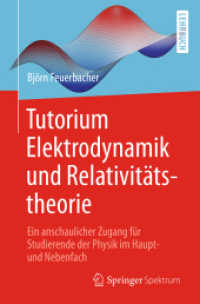- ホーム
- > 洋書
- > 英文書
- > History / World
Full Description
An Open Access edition of this book will be available on publication on the Liverpool University Press and African Minds websites
Though Greco-Roman antiquity ('classics') has often been considered the handmaid of colonialism, its various forms have nonetheless endured through many of the continent's decolonising transitions. Southern Africa is no exception. This book canvasses the variety of forms classics has taken in Zimbabwe, Mozambique and especially South Africa, and even the dynamics of transformation itself. How does (u)Mzantsi classics (of southern Africa) look in an era of
profound change, whether violent or otherwise? What are its future prospects? Contributors focus on pedagogies, historical consciousness, the creative arts and popular culture. The volume, in its overall shape, responds to the idea of dialogue - in both the Greek form associated with Plato's rendition of Socrates' wisdom and in the African concept of ubuntu. Here are dialogues between scholars, both emerging and established, as well as students - some of whom were directly impacted by the Fallist protests of the late 20-teens. Rather than offering an apologia for classics, these dialogues engage with pressing questions of relevance, identity, change, the canon, and the dynamics of decolonisation and potential recolonisation. The goal is to interrogate classics - the ways it has been taught, studied, perceived, transformed and even lived - from many points of view.
Contents
1
Nothing about us? Reflections on classics in
southern Africa (Samantha Masters, Imkhitha Nzungu and Grant Parker)
I FIRST DIALOGUE: ON BAGGAGE
2 Classical imagery and policing the African body (Ian Glenn)
3 Classics and colonial administration in Southern Rhodesia
(Obert Mlambo and John Douglas McClymont)
4 Conversation with Christiaan Bronkhorst
II SECOND DIALOGUE: ON INTERSECTING IDENTITIES
5 Classics for the third millennium: African options after
The Fall (Jo-Marie Claassen)
6 The liberatory potential of Latin studies: Stellenbosch University's
Latin Project (Reshard
Kolabhai and Shani Viljoen)
7 Conversation with Chanté Bhugwanth
III THIRD DIALOGUE:
ON CLASSICS AND THE CANON
8 Responses to
crisis: Cicero in Zimbabwe (Madhlozi Moyo)
9 Rethinking the commemorative landscape in South Africa after
The Fall: A pedagogical case study (Samantha Masters)
10 Conversation with Amy Daniels
IV FOURTH DIALOGUE: FROM RECEPTION TO RE-IMAGINATION
11 African port cities and the classics (Carla Bocchetti)
12 'Wilder than Polyphemus': Towards a tragic poetics of the
post-colonial consumption of symbols (David van Schoor)
13 Conversation with Nuraan Essop
14 Ovid in the time of statues (Grant Parker)








